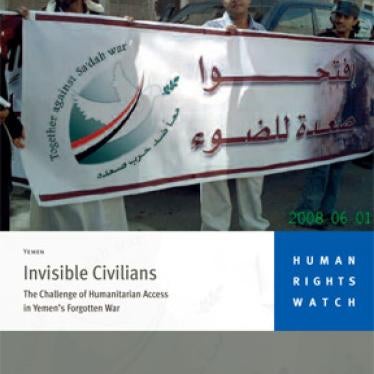(San’a) – Tens of thousands of civilians in northern Yemen have been displaced or cut off from aid in fighting between government and rebel forces, Human Rights Watch said in a new report released today. Yemen’s government as well as rebel forces should take immediate steps to ensure that they get the humanitarian aid they need in the aftermath of recent fighting.
The 50-page report, “Invisible Civilians: the Challenge of Humanitarian Access in Yemen’s Forgotten War,” documents how the Yemeni authorities have severely restricted humanitarian access to its northernmost governorate, Sa’da, ravaged by four years of armed conflict. As of October 2008, up to 70,000 people in remote areas and towns remained outside the reach of aid agencies.
“Thousands of civilians are in need, and yet the government is still depriving them of aid,” said Joe Stork, deputy Middle East and North Africa director at Human Rights Watch. “This violates international law and common decency. Countries and UN agencies that provide assistance to Yemen need to press the government to allow humanitarian access.”
When a fifth round of fighting in the northern conflict erupted in May 2008, the government imposed an information blackout and blocked the movement of commercial goods, including basic foods and fuel, an apparent act of unlawful collective punishment. The fighting ended in mid-July, but tens of thousands of people remain outside the reach of aid agencies.
Human Rights Watch said that the rebels, known as Huthis after their founder Husain al-Huthi, also prevented humanitarian access to areas under their control.
The report is based on three weeks of investigation in Yemen’s capital, San’a, in July 2008, which included interviews with displaced persons and aid agencies based in San’a. Human Rights Watch was unable to travel to areas directly affected by the conflict because the government did not grant permission to travel.
“Invisible Civilians” also examines the government’s attempt to keep the war from the public eye by banning journalists from the conflict zone, arbitrarily arresting those who report on civilian casualties, and cutting off most mobile-phone subscribers living in affected areas.
Human Rights Watch called on Yemeni authorities to end their restrictions on media coverage of the war and its aftermath, and to restore the phone network so that aid agencies can effectively communicate and work in the conflict zone.
By mid-July, 60,000 displaced persons had found refuge in the town of Sa’da, where they received limited assistance in camps and private homes. By the end of September, the government allowed humanitarian access to a limited number of other towns, but well into October, tens of thousands were still not getting assistance.
The report describes how United Nations agencies and other international actors in Yemen – such as the European Union and other countries – have broadly failed to hold the government and Huthi fighters to account for their obligations under international humanitarian law, including the need to ensure access to civilians in need.
“The Yemeni authorities have done their best to prevent any international awareness of this war and its consequences,” Stork said. “Unfortunately, the UN and foreign governments have largely obliged by remaining silent themselves.”
Background
In June 2004, members of “The Believing Youth,” a revivalist movement among the Zaidi Shia, took up arms after the government closed their religious schools. They are commonly known in Yemen as Huthis, after Husain al-Huthi, who led the movement in the 1990s. The Zaidis, a branch of Shia Islam mainly found in Yemen’s northern highlands, are a minority in Yemen’s mainly Sunni Muslim population, but ruled the country prior to a military-led revolution in 1962 and remain well-represented in senior political and military posts.
The Huthis have never issued clear demands to the government, although leading Huthi figures have cited a range of grievances. These include the need to protect Zaidi religious identity, opposition to the Yemeni government’s close cooperation with the United States, economic neglect of Sa’da governorate, and what they view as unjustified government military operations against them.
The president of Yemen, Ali Abdullah Saleh, declared an end to the fifth and most recent round of fighting on July 17, 2008. However, many longtime observers believe that without a written and monitored peace agreement, a sixth round of fighting is likely.
On October 24, 2008, Human Rights Watch published a related report, “Yemen: Disappearances and Arbitrary Arrests in the Armed Conflict with Huthi Rebels,” which documents arbitrary arrests and enforced disappearances in connection with the conflict in Sa’da.







